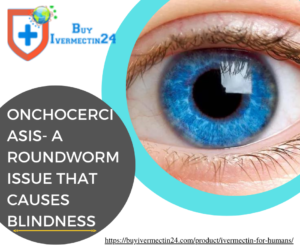Introduction
Onchocerciasis, or river blindness, is a parasitic infection caused by Onchocerca volvulus, transmitted through blackfly bites. It leads to severe itching, skin damage, and blindness if untreated. It primarily affects communities near rivers in Africa, Latin America, and Yemen.
What Is Onchocerciasis?
This disease occurs when blackflies inject larvae (microfilariae) into the skin. These mature into adult worms, releasing thousands of microfilariae that migrate to the skin and eyes, causing intense itching and progressive vision loss.
Treatment & Benefits
✅ Ivermectin (Mectizan) kills microfilariae, preventing blindness
✅ Doxycycline weakens adult worms by eliminating Wolbachia bacteria
✅ Surgical removal may help reduce worm burden in severe cases
✅ Mass drug administration (MDA) programs help control the disease
Side Effects & Risks
- Ivermectin: Fever, dizziness, swelling (Mazzotti reaction)
- Doxycycline: Gastrointestinal discomfort, sun sensitivity
- Severe cases: Neurological complications if co-infected with Loa loa
⚠️ Always consult a doctor before treatment, especially in high-risk areas.
Dosing & Administration
- Ivermectin: A single dose every 6–12 months in affected regions
- Doxycycline: 100 mg daily for 4–6 weeks (for adult worm elimination)
🛑 Dosage should be determined by a healthcare professional.
Conclusion
Onchocerciasis is a preventable cause of blindness. Early treatment with ivermectin and public health efforts are key to controlling its spread.
For more information:

